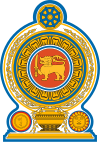
Chandrika Bandaranaike Kumaratunga , commonly referred to by her initials CBK, is a Sri Lankan politician who served as the fifth President of Sri Lanka, from 12 November 1994 to 19 November 2005. The country's first and only female president to date and the country's second female prime minister. She is the daughter of two former prime ministers and was the leader of the Sri Lanka Freedom Party (SLFP) until the end of 2005.
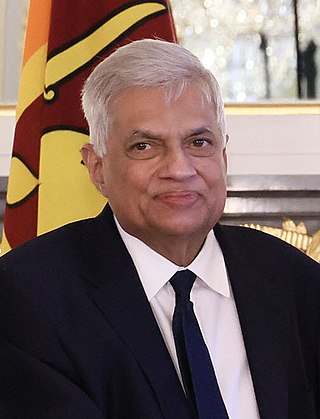
Ranil Wickremesinghe is a Sri Lankan politician who is the 8th and current president of Sri Lanka. He also holds several ministerial positions, including the Minister of Finance, Minister of Defence, Minister of Technology and Minister of Women, Child Affairs and Social Empowerment.

The United National Party, often abbreviated as UNP, is a centre-right political party in Sri Lanka. The UNP has served as the country's ruling party, or as part of its governing coalition, for 38 of the country's 74 years of independence, including the periods 1947–1956, 1965–1970, 1977–1994, 2001–2004 and 2015–2019. The party also controlled the executive presidency from its formation in 1978 until 1994.

Mahinda Rajapaksa is a Sri Lankan politician. He served as the President of Sri Lanka from 2005 to 2015; the Prime Minister of Sri Lanka from 2004 to 2005, 2018, and 2019 to 2022; the Leader of the Opposition from 2002 to 2004 and 2018 to 2019, and the Minister of Finance from 2005 to 2015 and 2019 to 2021. He has been a Member of Parliament (MP) for Kurunegala since 2015.
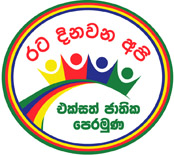
The United National Front (UNF) later the United National Front for Good Governance (UNFGG) was a political alliance in Sri Lanka led by the United National Party.
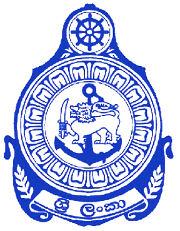
The Sri Lanka Navy (SLN) is the naval arm of the Sri Lanka Armed Forces and is classed as the country's most vital defence force due to its island geography and is responsible for the maritime defence of the Sri Lankan nation and its interests. The role of the Sri Lanka Navy is to conduct operations at sea for the defence of the nation and its interests and conduct prompt and sustainable combat operations at sea in accordance with the national policies.

In a 2005 BBC World Service Poll, 30% of Sri Lankans view American influence positively, with 20% expressing a negative view. According to the 2012 U.S. Global Leadership Report, 14% of Sri Lankans approve of U.S. leadership, with 37% disapproving and 49% uncertain.

India–Sri Lanka relations, Indian-Sri Lankan relations, or Indo-Sri Lanka relations, are the bilateral relations between India and Sri Lanka. India has emerged as the foremost partner for Sri Lanka in the endeavor to revitalize its economy, reform its bureaucracy, and enhance decision-making processes for future economic collaborations. Both countries have reached an agreement to strengthen their economic and energy ties, signaling a new phase of cooperation and mutual benefits. Only 4% of Sri Lankans have a negative view on India, the lowest of all the countries surveyed by the Ipsos GlobalScan. The two countries are also close on economic terms with India being the island's largest trading partner and an agreement to establish a proto single market also under discussion at an advanced stage. There are deep ethnic and cultural links between the two countries. India and Sri Lanka share a maritime border. India is the only neighbour of Sri Lanka, separated by the Palk Strait; both states occupy a strategic position in South Asia and have sought to build a common security umbrella in the Indian Ocean. Both India and Sri Lanka are republics that are members of the Commonwealth of Nations. India has achieved the distinction of being the initial nation to submit its formal endorsement for the financial assistance and debt restructure proposal of Sri Lanka to the International Monetary Fund (IMF), headquartered in Washington.

Pakistan–Sri Lanka relations refer to bilateral relations between Pakistan and Sri Lanka. Both countries are located in South Asia. The earliest proper diplomatic and trade contacts between Pakistan and Sri Lanka date back as early as 1948. In 2013, the then prime minister Nawaz Sharif said that there were strong bonds of friendship between the two countries.

Japan–Sri Lanka relations refers to the bilateral relations between the Sri Lanka and Japan.
R. M. Seneviratne Bandara Nawinne is a member of United National Party and a member of the Parliament of Sri Lanka. He was long time member of Sri Lanka Freedom Party but cross to the United National Party in 2015 General elections. He was appointed as a cabinet minister under the National Government led by Prime Minister Ranil Wickramasinghe.

Associated Newspapers of Ceylon Limited (ANCL), also known as Lake House. It publishes three daily, three weekend, five weekly, two monthly and three annual publications in Sinhala, English and Tamil.

Estonia-Sri Lanka relations are foreign relations between Estonia and Sri Lanka. Estonia has an embassy Colombo. Sri Lanka has a non resident embassy in Stockholm. Estonia's 2004 accession to the European Union had a positive effect on bilateral relations with Sri Lanka, since the EU is one of Sri Lanka's biggest donors and trade partners.

The 2013 Commonwealth Heads of Government Meeting was the 23rd Meeting of the Heads of Government of the Commonwealth of Nations. It was held in Colombo, Sri Lanka, from 15 to 17 November 2013. Commonwealth leaders agreed on Sri Lanka as the 2013 host for the meeting when they met in Port of Spain, Trinidad and Tobago, in 2009. Sri Lanka, which was originally slated to host the summit in 2011, was accused of committing atrocities during the Sri Lankan civil war and the summit was instead held in Perth, Australia; Colombo was given the 2013 summit instead. The leaders of Canada, Mauritius, and India boycotted the summit, citing alleged human rights violations by Sri Lanka against its Tamil minority. Protests were also banned during the summit. President Mahinda Rajapaksa summarised the summit's events as: "Issues covered in the communique include development, political values, global threats, challenges and Commonwealth cooperation." However, the meeting was overshadowed by controversy over Sri Lanka's human rights record and the alleged war crimes during the final stages of the civil war. This was the first time in 40 years that the Head of the Commonwealth, Queen Elizabeth II, was not present at the CHOGM.
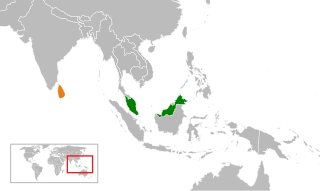
Malaysia–Sri Lanka relations refers to bilateral foreign relations between Malaysia and Sri Lanka. Malaysia has a high commission in Colombo, and Sri Lanka has a high commission in Kuala Lumpur. Both countries are members of the Commonwealth of Nations and the Group of 77.

Sri Lanka–United Kingdom relations, or British-Sri Lankan relations, are foreign relations between Sri Lanka and the United Kingdom.

Parliamentary elections were held in Sri Lanka on 17 August 2015, ten months ahead of schedule, to elect 225 members to Sri Lanka's 15th Parliament.

S.W.R.D. Bandaranaike's foreign policy emphasized the idea of non-alignment however he had strong ties with socialist and communist nations as well as with Arab nations and India. He shifted the foreign policy of Sri Lanka from being pro-western under the previous right wing United National Party governments to non-alignment under his left wing Sri Lanka Freedom Party government. A remarkable accomplishment of his foreign policy was removing British naval and air bases from Sri Lanka.





















